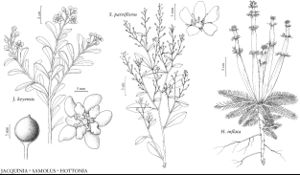Difference between revisions of "Samolus"
Sp. Pl. 1: 171. 1753.
Gen. Pl. ed. 5, 78. 1754 ,.
FNA>Volume Importer |
FNA>Volume Importer |
||
| Line 6: | Line 6: | ||
|place=1: 171. 1753 | |place=1: 171. 1753 | ||
|year=1753 | |year=1753 | ||
| − | }}{{Treatment/Publication | + | }}, {{Treatment/Publication |
|title=Gen. Pl. ed. | |title=Gen. Pl. ed. | ||
|place=5, 78. 1754 , | |place=5, 78. 1754 , | ||
| Line 75: | Line 75: | ||
|publication year=1753; | |publication year=1753; | ||
|special status= | |special status= | ||
| − | |source xml=https://jpend@bitbucket.org/aafc-mbb/fna-data-curation.git/src/ | + | |source xml=https://jpend@bitbucket.org/aafc-mbb/fna-data-curation.git/src/f6b125a955440c0872999024f038d74684f65921/coarse_grained_fna_xml/V8/V8_523.xml |
|genus=Samolus | |genus=Samolus | ||
}}<!-- | }}<!-- | ||
-->[[Category:Treatment]][[Category:Theophrastaceae]] | -->[[Category:Treatment]][[Category:Theophrastaceae]] | ||
Revision as of 20:29, 24 September 2019
Herbs, perennial; resin canals apparent. Stems erect or ascending to prostrate or arching, simple or diffusely branched. Leaves basal and cauline, cauline mostly alternate; blade spatulate to obovate, elliptic, or orbiculate, base attenuate to cuneate, margins usually entire, sometimes slightly crenate, apex obtuse to rounded (sometimes apiculate), surfaces glabrous, sometimes obscurely punctate. Inflorescences terminal and axillary racemes or panicles [flowers solitary], 3–70-flowered, sometimes pedunculate. Pedicels present, bracteate or ebracteate. Flowers: sepals connate proximally, calyx lobes triangular to ovate, shorter to longer than tube; corolla white to pinkish, campanulate, lobes usually longer than tube, apex rounded to truncate or emarginate, sometimes erose; stamens borne near apex of corolla tube; filaments distinct; anthers closely aggregated initially around style or not; staminodes absent or 5 [10], borne at apex of corolla tube, petaloid or not; stigma capitate, truncate, or 2-lobed. Capsules pale tan to brown, valvate, globose; valves opening to base of calyx lobes. Seeds 20–50+, blackish brown to reddish brown, hemispheric, angular, minutely alveolate or reticulate. x = 12, 13.
Distribution
North America, Mexico, West Indies, Central America, South America, Eurasia, Africa (South Africa).
Discussion
Species 10–12 (3 in the flora).
Selected References
Lower Taxa
Key
| 1 | Inflorescences pedunculate, peduncles 5-10 cm; pedicels ebracteate; staminodes absent. | Samolus ebracteatus |
| 1 | Inflorescences sessile or pedunculate, peduncles to 1.5 cm; pedicels bracteate; staminodes present | > 2 |
| 2 | Stems erect or ascending; plants not stoloniferous; pedicels with bract ca. midlength. | Samolus parviflorus |
| 2 | Stems prostrate or arching; plants stoloniferous or mat-forming; pedicels with bract proximal to midlength. | Samolus vagans |
